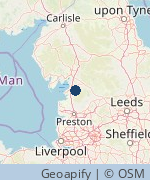Cuthbert The Bad and the Lancashire Witches
Colin Penny
- Region:
- North West
- Notice Period:
- Emergency (maybe less than one week's notice)
- Type:
- Professional
- Fee:
- Paid: 75.00
- Category:
- History
- Updated:
- 24th March 2025
- Tagged:
- Lancashire Witches | Witches | Lancashire | Pendle Witches
The trials of the Lancashire Witches that took place at Lancaster Castle in August 1612 are among the most famous and infamous in English history. Twenty people stood accused, of whom ten were hanged on Golgotha Hill overlooking the town following the two-day trial, and the case stands as the second-largest witchcraft trial in British legal history (the largest being in Salem, Massachusetts (still a British colony at the time) in 1692).
As a result, the story is well known and has been the inspiration for many books, television and radio shows. Yet, none of these has answered one fundamental question - why did these events occur in 1612? What, or who, was the driving force behind the prosecutions? In the vast majority of narratives, the blame is laid squarely on the shoulders of the magistrate, Roger Nowell, who is usually cast as a single-minded witch-hunter. But this will not do; two years earlier Roger had been the high sheriff of Lancashire, which placed him in control of law and order in the county - yet there was no serious persecution of witches in that year when he had all of the resources he would have needed to carry one out. Clearly, Roger was no witch-hunter.
So, if not Roger - then who? Based on original research, this talk will uncover the man who was the real instigator of the trials and his motivation for doing so. A man who was also linked with the Essex Rebellion in 1601 and the Gunpowder Plot in 1605. Prepare for a rollercoaster of a ride as we reveal the life and times of Cuthbert the Bad.
Views: 2137 | Enquiries: 22About Colin Penny
Hello. I am a very engaging speaker, with excellent presentation skills honed over more than twenty years working as a professional historian, tour guide, heritage management professional, and public speaker - yes, I'm also in a rock n roll band. My historical interests are wide-ranging, my delivery is sharp, humorous, and second-to-none, and I guarantee that you will not be disappointed. I have given hundreds of talks over the years to a diverse range of groups, including women's institutes, mothers' unions, U3A groups, Probus and Rotary groups, historical and family history societies, men's fellowships, the National Trust, etc., etc. I am always asked back, and have returned to many groups many times. Thank you for reading this, and I hope to hear from you.
Other Talks on SpeakerNet by Colin Penny
- Caligula: Mad or Just Bad?
- Historic Graffiti: The Writing's On The Wall
- William Calcraft: England's Longest-Serving Hangman
- The Emperor Hadrian
- A History of the Scold's Bridle in Early Modern Britain
- The Life, Loves and Films of Errol Flynn
- The Life and Reign of King Henry III
- King Henry IV
- A Georgian Scandal: The Trial of Edward Gibbon Wakefield
- The Lancashire Riots and the Chatterton Fight of 1826
Send a message to the speaker
If you are interested in this talk and wish to contact the speaker, please complete the following form:
